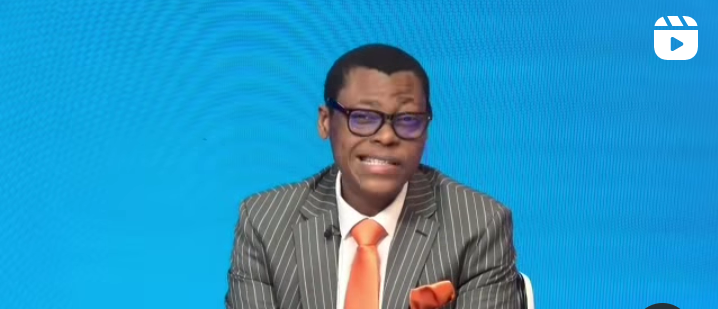By Okey Ndibe
It is tempting to refer to Rufai Oseni, one of the co-hosts of Arise TV’s staggeringly popular “The Morning Show,” as the most fearless man on Nigerian TV. Yet, that description slightly misses the mark.
True enough, Oseni is fearless in at least two ways. If you have ever watched his monologues, then you’re familiar with his slashing, take-no-prisoner’s style. It smacks of a master debater at the top of his game. He marshals his arguments, and the often-irrefutable facts that undergird them, with an orator’s flair.
There’s also his signature interview mode. There’s little doubt that he comes well prepared for encounters with the show’s guests, many of them political heavyweights. His questions often strike at the heart of any matter that’s the focus of the program. In short, he’s adept at asking pointed, unsparing, and fact-fueled questions.
Surely, it would be easy to name fearlessness as his defining quality. But I’d like to argue, instead, that his mettle does not lie merely in being intrepid. What makes him a compelling presence on television, I suggest, is stubborn fidelity to sound journalistic principles.
Many Nigerian politicians are versed in hollow rhetoric, by which I mean the art of using too many words to say little or nothing. They’d boast, for example, about “delivering the dividends of democracy,” without being able to list any significant achievements. They’d claim to have “totally transformed” their environment, but lack the ability to point to any enduring signpost.
Of course, this species of politician counts on lazy, servile or corrupt journalists to sustain his narrative. He cultivates compliant reporters and unctuous interviewers. Some of these journalists are experts in the art of nodding to a politician’s every lie, especially when the liar flaunts some cash. At any rate, it serves politicians to flock to media folks who can’t, or won’t, puncture the balloon of inflated political claims or blatant lies.
In Oseni, such politicians meet their nemesis. This TV man may have a calm, clerical face, but you won’t find him genuflecting before a shrine of lies. Far from being an obsequious pushover, he comes across as sinewy. He’s as repulsed by mendacity and duplicity as the politician is enamored of them.
And that is part of what makes him a dangerous man.
In a recent interview with my co-host, Emeka Onyeagwa, and me, Oseni spoke about the impulse that animates his style. He declared an abiding interest in logic. For him, issues of public import must be subjected to close, rational scrutiny. If something doesn’t add up for him, he won’t scuff off to the corner, accepting any explanation, however illogical. No, he raises as many questions as possible to arrive at a grounded understanding of the issue. If a proffered answer strikes him as absurd, he won’t rest until the truth emerges – or the liar is unmasked.
Oseni’s robust prospecting for the truth often puts him at odds with many powerful figures. In a season saturated with electoral politics, his crossfires with politicians and their hirelings have emerged as flash points. He’s not one to suffer fools gladly. As a result, his singular verbal industry has helped to advertise the ludicrousness of certain politicians.
Oseni is something of an equal opportunity auditor of political deceptions. He has flayed politicians of all affiliations. However, he has particularly scourged Bola Ahmed Tinubu, presidential candidate of the All Progressives Congress. When the APC candidate appeared at Chatham House and took to distributing routine questions to members of his delegation, Oseni characterized the occasion as a shame. He all but mocked one of Tinubu’s spokesmen who made the bizarre claim that a bullion van stationed inside the candidate’s home in 2019 had missed its way. Oseni chided Governor Hope Uzodinma of Imo State – an Igbo by birth – for asserting that the Igbo should abandon all hope of one of their number being elected president this year.
In Nigeria, ethnic and religious sentiments frequently over-determine political positions. Even some of the most educated people often fall back on clannish considerations. Oseni bucks the trend. It’s well nigh impossible to predict his position on any public matter. He’s aware that his society mandates fealty to ethnicity or sect. Yet, he demurs, insisting on exercising his mind, thinking things through.
That’s another factor in his high danger quotient. On social media, where his following is considerable, he’s praised by many, but pilloried by some. But he’s swayed neither by commendation nor censure. Instead, he has a sense of peace once his posture on any issue strikes him as logically coherent.
Oseni would not be drawn into any electoral predictions. But he could not resist warning about the potential of the judiciary to foul up the political process. Nigeria’s democratic and developmental dreams remain hampered by rogue judges who bastardize the constitution, especially when they sell verdicts to the highest bidder.
The most dangerous man on Nigerian television left no doubt that, post-election, his sights will be trained on the shenanigans of judicial prostitutes. That is bad news for morally stinky judges, but good for the rest of us.

